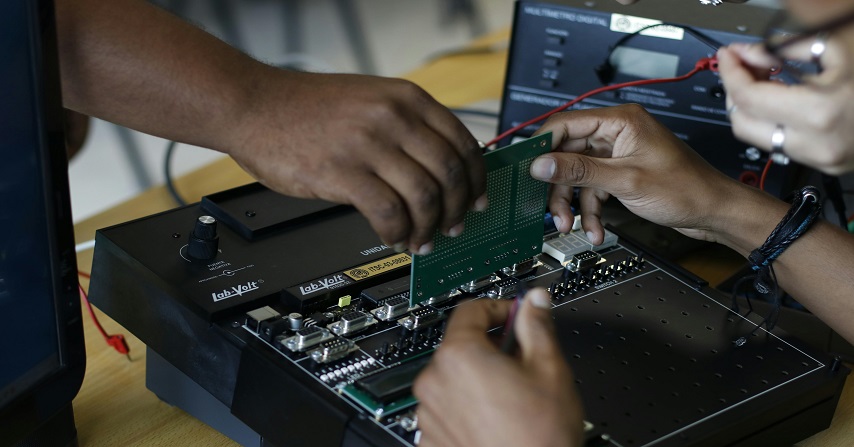
Master of Engineering (M.E.)
The Master of Engineering (M.E.) is a two-year postgraduate degree program designed for engineering graduates seeking to specialize in a particular domain. This program delves deeper into theoretical knowledge and practical applications, preparing students for advanced roles in research, development, and industry leadership.
Table of Content
M.E. Program Highlights
Candidates and students can refer to the table below to understand key aspects of the M.E. degree program.
| Particulars | Details |
| Degree Name | Master of Engineering (M.E.) |
| Course Duration | 2 Years |
| Eligibility Criteria | B.E./B.Tech in a relevant discipline |
| Minimum Required Marks | 50–60% in undergraduate engineering program |
| Admission Process | Entrance Exam (GATE/TANCET/PGCET) + Counselling/Interview |
| Course Fees | ₹50,000 – ₹2 Lakh per annum |
| Examination Type | Semester-wise |
| Program Level | Postgraduate (PG) |
| Top Specializations | Mechanical, Civil, CSE, ECE, Electrical, AI, Data Science, etc. |
| Top Colleges Offering M.E. | IITs, NITs, BITS Pilani, Anna University, VIT, Jadavpur Univ. |
| Career Roles | Project Manager, R&D Engineer, Data Scientist, Subject Matter Expert |
| Popular Recruiters | TCS, ISRO, DRDO, Infosys, IBM, Bosch, Siemens, Microsoft |
| Average Salary | ₹6 – ₹12 LPA (varies by role and industry) |
Upcoming M.E. Entrance Exams (2025)
Candidates aspiring to pursue an M.E. degree in India must appear for relevant national or state-level postgraduate engineering entrance exams.
| Exam Name | Application Dates | Exam Date | Result Declaration |
| GATE 2025 | Sep–Oct 2024 | Feb 1–2 & 8–9, 2025 | Mar 2025 |
| TANCET 2025 | Jan 2025 | Feb 2025 | Mar 2025 |
| PGCET 2025 | May–June 2025 | July 2025 | July–Aug 2025 |
| AP PGECET | Apr–May 2025 | June 2025 | June–July 2025 |
| TS PGECET | Mar–Apr 2025 | May 2025 | June 2025 |
Top M.E. Colleges in India
Candidates and students can refer to the following top-ranking institutions that offer M.E. programs:
| Rank | College Name | NIRF Score | State |
| 1 | Indian Institute of Technology Madras | 89.46 | Tamil Nadu |
| 2 | Indian Institute of Technology Delhi | 86.66 | Delhi |
| 3 | Indian Institute of Technology Bombay | 83.09 | Maharashtra |
| 4 | Indian Institute of Technology Kanpur | 82.79 | UP |
| 5 | Indian Institute of Technology Kharagpur | 76.88 | West Bengal |
| 6 | Indian Institute of Technology Roorkee | 76.00 | Uttarakhand |
| 7 | National Institute of Technology Tiruchirappalli | 66.88 | Tamil Nadu |
| 8 | Jadavpur University | 65.62 | West Bengal |
| 9 | Vellore Institute of Technology | 66.22 | Tamil Nadu |
| 10 | Anna University | 65.34 | Tamil Nadu |
Eligibility Criteria for M.E.
Candidates and students applying for the M.E. programs must meet specific academic qualifications depending on the type of course or specialization.
| Program Type | Eligibility Requirement | Duration |
| Regular M.E. Program | B.E./B.Tech with minimum 50–60% marks + Entrance | 2 Years |
| Sponsored/NRI M.E. | Graduation + Industry/Employer Sponsorship Letter | 2 Years |
| Integrated M.E./M.Tech | 10+2 with PCM + Integrated program entrance exam | 5 Years |
Detailed Eligibility Requirements
- Academic Qualification: Candidates must have completed B.E. or B.Tech in a relevant field.
- Entrance Exam: GATE is the primary national-level exam. State-level exams like TANCET, PGCET, or institute-specific exams may also be accepted.
- Minimum Marks: 50–60% in undergraduate engineering (varies by institution and category).
- Work Experience (if applicable): Some sponsored programs may require 1–2 years of professional experience.
Admission Process for M.E.
The standard admission pathway candidates and students follow to gain entry into the M.E. program includes:
- Eligibility Check: Ensure B.E./B.Tech degree is complete with required marks.
- Entrance Exams: Appear for GATE, TANCET, PGCET, or university-level exams.
- Application Submission: Register and submit documents online on college/university portals.
- Merit List & Counselling: Qualified students participate in centralized counselling or individual college interviews.
- Final Selection: Admission is confirmed upon payment of fees and document verification.
Some private institutions may additionally conduct group discussions (GD) or personal interviews (PI) as part of the selection process.
Why Choose M.E.?
The Master of Engineering program offers students and candidates an opportunity to deepen their expertise, build a research-oriented mindset, and unlock advanced roles across technical and leadership domains.
- Academic Depth: The M.E. curriculum promotes in-depth understanding and theoretical rigor in specialized fields of engineering, suited for academic and R&D careers.
- Advanced Career Opportunities: Graduates of M.E. programs are well-positioned for roles in engineering design, system architecture, academic research, and managerial positions in tech-driven organizations.
- Competitive Salaries: M.E. graduates command higher average salaries than undergraduates, especially in fields such as AI, Big Data, VLSI Design, and Aerospace Engineering.
- Research and Innovation: The course often includes thesis work, dissertation, or publication opportunities that prepare students for Ph.D. or careers in R&D organizations like ISRO, DRDO, and CSIR.
Industry-Focused Curriculum: With internships, live projects, industry collaboration, and modern lab exposure, candidates gain valuable hands-on experience relevant to their specialization.
Popular M.E. Specializations
Students and candidates can explore a variety of M.E. specializations as per their academic interest and market demand:
- M.E. in Computer Science Engineering
- M.E. in Mechanical Engineering
- M.E. in Civil Engineering
- M.E. in VLSI Design
- M.E. in Electrical Engineering
- M.E. in Artificial Intelligence
- M.E. in Robotics
- M.E. in Embedded Systems
- M.E. in Structural Engineering
- M.E. in Thermal Engineering
- M.E. in Data Science
Subjects Covered in a Master’s in Engineering (ME)
The Master’s in Engineering Management (MEM) is an interdisciplinary and application-focused program that blends technical expertise with business and leadership principles. Students are required to complete a set of core courses, choose from a variety of electives, and undertake mandatory internship modules aligned with their area of specialization.
Common Electives Offered in ME Programs
While elective options may vary by university, some of the most widely offered and in-demand subjects include:
- Computer Simulation for Risk and Operational Analytics
- Project and Product Management
- Manufacturing Strategy and Operations
- Systems Engineering and Architecture
- Environmental Systems: Economics, Policy, and Analysis
- Applied Machine Learning
- Data Science for Business Intelligence
- Operations and Supply Chain Strategy
- Technology Innovation and Commercialization
Core Subjects Offered in ME Programs
Although the exact curriculum differs by institution, core courses often include:
- Leadership and Organizational Behavior
- Strategic Management
- Accounting for Engineers
- Financial Management for Technical Managers
Top Recruiters for M.E. Graduates
Leading organizations that actively hire M.E. candidates and students include:
- ISRO
- DRDO
- Bosch
- Intel
- Infosys
- Microsoft
- Accenture
- TCS
- Capgemini
- Siemens
- IBM
- Mahindra & Mahindra
M.E. Salary in India: Job-Wise Breakdown
Students and candidates can expect attractive compensation based on specialization, company, and job role.
| Job Role | Average Annual Salary (INR) |
| R&D Engineer | ₹8 – ₹10 LPA |
| Software Developer | ₹7 – ₹9 LPA |
| Data Scientist | ₹10 – ₹12 LPA |
| Structural Engineer | ₹6 – ₹8 LPA |
| Electrical Engineer | ₹6 – ₹7 LPA |
| Systems Architect | ₹12 – ₹15 LPA |
| Project Manager | ₹10 – ₹14 LPA |
| AI/ML Engineer | ₹12 – ₹16 LPA |
